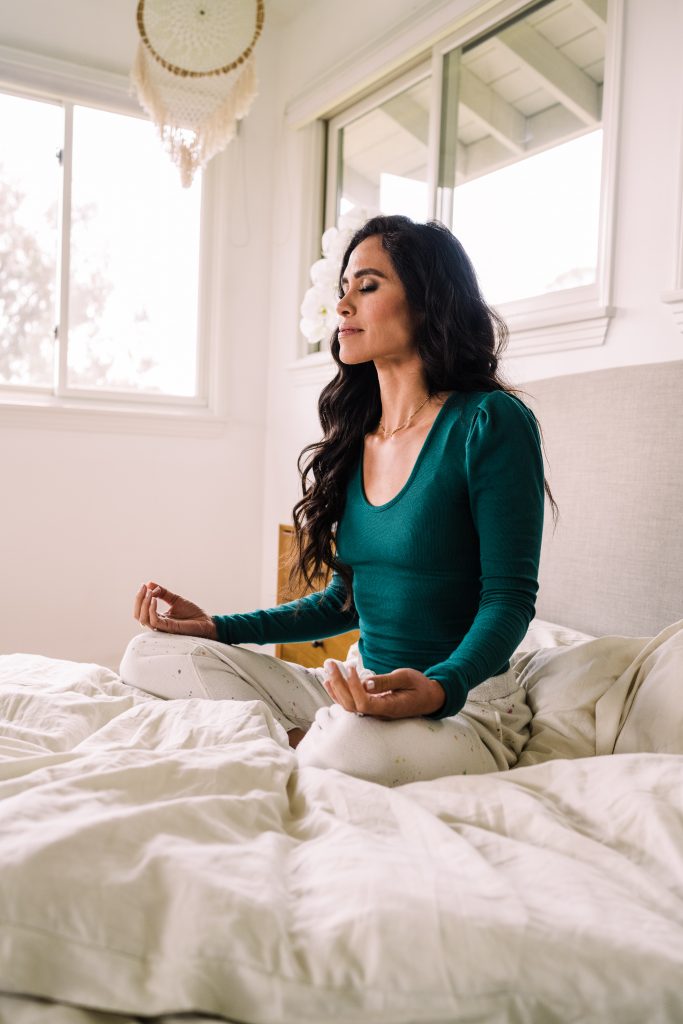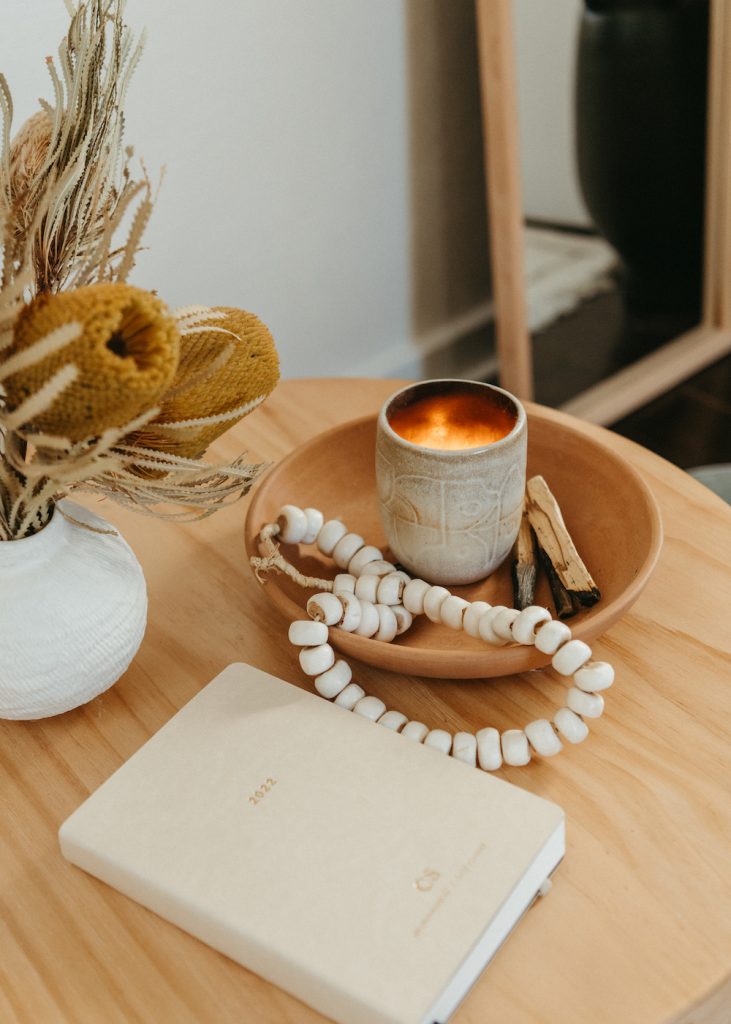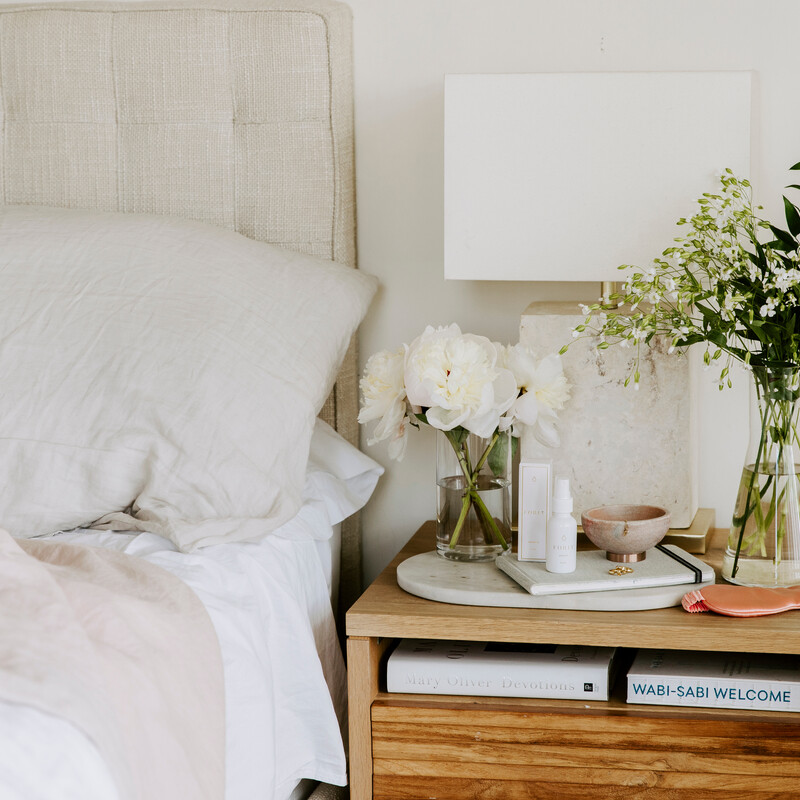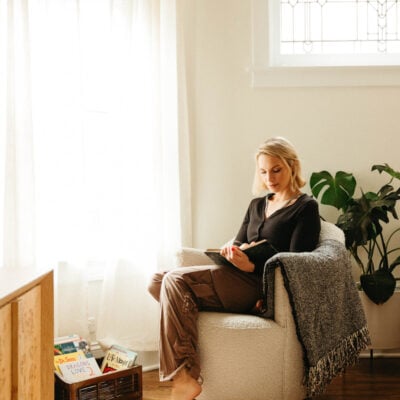It’s a perennial problem many of us face (morning people included): how to get more sleep. But to wake up feeling rested and ready to tackle the day ahead, quantity and quality have to each come into play. While aiming to get your 7-9 recommended hours is a must, it’s important to ensure that your time is efficiently well-spent (keeping all the key sleep stages top of mind). Maintaining an optimal room temperature, investing in a firm but comfy mattress, and even paying attention to what we eat can all impact our snoozin’ time. But mindfulness for sleep? Say more.
The past several years have seen a collective deep dive into the world of mindfulness. As a productivity-driven society, countless studies have come out on everything from how mindfulness can make us more effective employees to how the practice can improve our physical performance. And while none of these are objectively bad (we’re all for feeling more focused, grounded, and centered), mindfulness can also support us in an area of wellness that’s garnered less attention: rest.
Feature image by Dagny Piasecki.


The time we give to intentional rest is just as, if not more, important as the time we spend learning, growing, and getting after our goals. To learn how to truly rest and return to our day feeling rejuvenated and restored, we tapped Jud Brewer, MD, Ph.D. for expert insights. The need for an alarm clock? A thing of the past.

Dr. Jud Brewer is a psychiatrist, neuroscientist, and executive medical director of behavioral health at Sharecare. He is also an associate professor of Behavioral and Social Sciences in the School of Public Health and the director of research and innovation at The Mindfulness Center at Brown University. He is passionate about understanding how our brains work, and how to use that knowledge to help people make deep, permanent change in their lives—with the goal of reducing suffering in the world at large.
For someone new to the world of mindfulness, how is it different from meditation?
Perhaps it’s the two words’ alliterative assonance, but all too often, mindfulness and meditation are mistakenly used synonymously. In identifying the difference, various definitions abound. Some define mindfulness as a quality, while meditation is a practice. Others call mindfulness “the awareness of ‘some-thing'” and meditation “the awareness of ‘no-thing.'”
“You can be mindful while you’re meditating, but you don’t have to be meditating to be mindful,” notes Dr. Brewer.
Dr. Brewer’s take illustrates the discrepancy clearly, encouraging us to view meditation “as a small circle within a larger circle of mindfulness.” While meditation refers to the formal practice of a sitting or walking meditation, mindfulness is altogether something broader. “You can be mindful while you’re meditating, but you don’t have to be meditating to be mindful,” notes Dr. Brewer.
Physiologically, how can mindfulness improve our sleep?
The general concept is easy enough to understand—a more relaxed conscious state, a more restful night’s sleep. But the science takes this basic idea a step further.
“Mindfulness exercises,” says Dr. Brewer, “particularly those focusing on breathwork, can slow down your heart rate and breathing.” What’s more, by practicing mindfulness, you’re actively letting go of the tension that builds up in the body throughout the day. As Dr. Brewer notes, this naturally allows you to experience a more relaxed state.


How does mindfulness target and treat the symptoms of stress that impact sleep quality?
It’s no secret that stress plays a huge role in suffering from less-than-ideal sleep. After all, we’re in the midst of a pandemic-induced (among many other contributing factors) mental health crisis, with anxiety, isolation, and stress levels increasing nationwide. This phenomenon, Dr. Brewer confirms, can lead to poor sleep.
But interestingly, there’s a stress about sleep that’s perhaps contributing even more. “I see this a lot with my patients,” says Dr. Brewer. “As soon as their heads hit the pillow, their minds start racing. They look at their clock and worry that they won’t get enough sleep and wake up tired the next day.”
The result? A vicious, stress-sleep cycle.
Mindfulness can be a powerful antidote. Rather than attempting to block out or rid our minds of these thoughts and emotions, the practice aims to change and shift how we relate to them. When stressful thoughts or feelings appear, Dr. Brewer suggests simply being aware of them and “paying attention to the sensations in our bodies.”
He offers up one of his go-to mindfulness practice RAIN as a way to navigate these challenges.
- RECOGNIZE Recognize the stress that’s coming up.
- ACCEPT/ALLOW Don’t try to push it away.
- INVESTIGATE Be curious. Ask: What is going on in my body right now? Do you feel tightness in your chest? Do you feel tension in your neck?
- NOTE Note the experience. Stay in the present movement until the sensation completely subsides.


Can mindfulness be used on an as-needed basis as well as be incorporated into a more consistent sleep routine?
Getting a poor night’s sleep every once in a while is, of course, different from insomnia. While some of us experience the tossing and turning characteristic of a restless night, insomnia is something altogether more pervasive. Defined as a sleep disorder making it difficult to fall or stay asleep, insomnia can impair your ability to function throughout the day. Thankfully, practicing mindfulness for sleep can positively impact both ends of the sleepless spectrum.
Dr. Brewer confirms, noting that mindfulness is appropriate to be used in times of immediate need and can be a key part of a regular, healthy sleep routine. However, making mindfulness a habit will yield the best results.
Not sure how to make this happen? Dr. Brewer’s easy, ‘five-finger breathing’ mindfulness practice can be done anytime, anywhere.
- Place the index finger of one hand at the base of the pinky finger of your opposite hand.
- Breathe in while tracing your index finger up to the tip of your pinky.
- Breathe out while moving back down.
- Continue until you’ve traced your entire hand.
- Reverse and move back toward your pinky.
What is the most effective way to use mindfulness in a nighttime routine? Ideally, how long should your mindfulness practice be for optimal sleep?
If you’re looking to optimize your snooze schedule by practicing mindfulness for sleep, Dr. Brewer says that when you’re in bed is best. Follow these steps for the most effective routine:
- Turn off the lights and lay down before starting your practice.
- Power down your device and remove distractions.
- Identify a specific mindfulness practice you enjoy and that can be done as you’re laying down.
For optimal results, Dr. Brewer suggests setting up your mindfulness practice as a habit. You can learn more about how to establish (and maintain!) healthy habits with Dr. Brewer’s habit framework here.
As for the timing of your mindfulness for sleep practice, he notes that there’s no one-size-fits-all approach. “It’s really what works best for you. I usually suggest people practice a mindfulness exercise until they fall asleep,” Dr. Brewer advises. This can be as short as 30 seconds up to a few minutes or more. What’s important, is that you’re creating space to relax your mind and body as you prepare to drift off to sleep.


What about during the waking hours? Can practicing mindfulness during the day have a positive effect on sleep quality at night?
“My lab just published a randomized controlled trial showing that when people practice mindfulness during the day to address their anxiety, it helped improve their sleep quality at night,” says Dr. Brewer.
His app, Unwinding Anxiety, was developed to deliver the mindfulness training used in the study. “By simply adding mindfulness, participants were more than four times as likely to report an improvement in their sleep,” he notes.
Conclusion? Tapping into mindfulness all throughout the day can do wonders for your sleep health.
What is your favorite way to practice mindfulness for sleep before bed?
Dr. Brewer encourages practicing a body scan before going to bed. He notes that the routine centers the focus on body sensations instead of feeding an anxiety-driven thought process. “The body scan helps you notice areas in the body where you’re holding tension, so it naturally relaxes and stops the worry habit loops,” he says. Head here for Dr. Brewer’s 10-minute guided body scan meditation.


What are supportive resources for learning more about mindfulness for sleep?
Dr. Brewer cites Mindfulness in Plain English as one of his favorite books when he first began learning to meditate. “I’ve personally read it three times. It’s a great introduction to mindfulness and a very accessible book.” You can also visit drjud.com for additional mindfulness and meditation resources.






